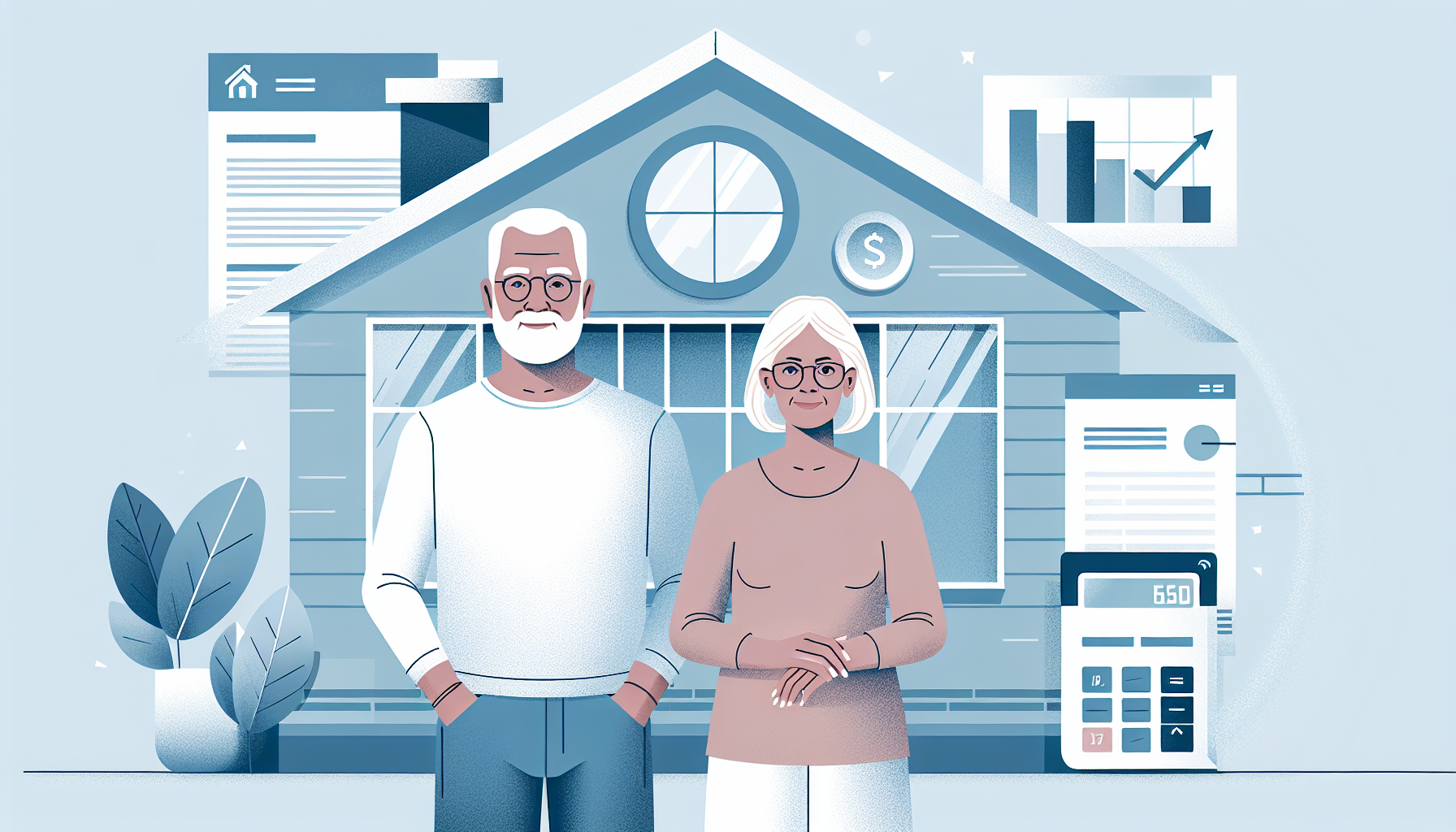
That Cape Cod you bought 30 years ago to raise your family in? The one with the steep stairs, sprawling yard, and more bedrooms than you need these days? Sure, it’s rich with memories, but maybe not quite the right fit for the years ahead. Or it could be that you’re completely content where you are now but wondering if that substantial home equity could be working harder for you.
Whatever your situation, understanding senior home financing options opens doors to possibilities for your future that you might not have considered. And no, being on a fixed income doesn’t mean your only option is selling and paying cash for your next place.
Why Consider Home Financing Options in Retirement?
“I’m retired—surely no one will give me a mortgage now!“
If that thought has crossed your mind, you might be surprised to learn that your age isn’t the barrier you might think. Lenders care about financial qualifications, not the number of candles on your birthday cake. Here’s when exploring senior home financing options makes sense:
When You’re Ready for a “Right-Sized” Home
A well-designed single-level home with less square footage but smarter design often feels like an upgrade, not a downsize. Using a mortgage for part of the purchase could allow you to invest some proceeds elsewhere or keep funds accessible for other goals.
When You Want to Put Your Equity to Work
Your home equity is likely one of your largest assets—but it’s not very liquid. Various financing tools allow you to access some of that equity while still living in your home, potentially helping you:
- Fund home modifications for aging in place
- Create an emergency fund
- Supplement retirement income
When Your Current Mortgage Could Use a Makeover
If you haven’t reviewed your current mortgage lately, you might be missing opportunities to lower monthly payments, reduce your interest rate, or eliminate mortgage insurance.
Conventional Mortgages as Senior Home Financing
Yes, you can still get a traditional mortgage in your 60s, 70s, or even 80s! The Equal Credit Opportunity Act prohibits lenders from discriminating based on age. What matters are the same factors that affect any borrower: your credit score, debt-to-income ratio, and ability to make payments.

Qualifying When Your Income Looks Different
Lenders primarily care about your ability to repay, not where your money comes from. For retirees, this typically means showing:
- Social Security benefits
- Pension income
- Retirement account distributions
- Investment income
Since retirement accounts typically deplete over time, most lenders want to see that these accounts can provide stable income for at least three years beyond the mortgage application.
Down Payment and Term Considerations
Many seniors have an advantage here – substantial equity from selling their previous home. This often makes it easier to put down a larger amount, securing better interest rates and avoiding private mortgage insurance.
While 30-year mortgages remain popular, some seniors find that 15-year or even 10-year terms better align with their goals. The shorter term means higher monthly payments but significantly less interest paid over time – and many find peace of mind in owning their home outright sooner.
“But do I really want a mortgage in retirement?”
It’s a valid question! A mortgage is a commitment, but it can also be a strategic financial tool. If the interest rate is low enough, and your investments earn more than you’re paying in interest, a mortgage might make sense. This is something to discuss with your financial advisor.
Home Equity Loans for Seniors
Think of a home equity loan as a way to access the value you’ve built up in your home without selling it. It’s like a second mortgage that converts a portion of your equity into cash – usually as a single lump sum that you repay over time.
How Home Equity Loans Work
You borrow a fixed amount against your equity, which becomes a lien on your property. The loan typically comes with a fixed interest rate, fixed monthly payments, and a set repayment term (often 5-15 years).
The beauty of a home equity loan is its simplicity – you know exactly how much you’re borrowing, what your interest rate is, and what your monthly payments will be for the entire term.
When This Senior Financing Option Makes Sense
A home equity loan can be particularly useful when you need a substantial sum for a one-time expense, such as:
- Major home renovations to improve accessibility
- Consolidating higher-interest debt
- Creating a financial cushion for unexpected expenses
Remember that your home serves as collateral – if you can’t make payments, you risk foreclosure. Also, if you’re planning to move within a few years, the closing costs might outweigh the benefits.
Home Equity Lines of Credit (HELOCs)
If a home equity loan is like a second mortgage, a HELOC is more like having a credit card secured by your home. You get access to a line of credit that you can draw from as needed, up to a predetermined limit based on your home’s equity.
Two Distinct Periods
A HELOC typically operates in two phases:
- The Draw Period (usually 5-10 years):
- Borrow as much or as little as needed, up to your credit limit
- Pay it back and borrow again
- Payments are typically interest-only during this time
- The Repayment Period (typically 10-20 years):
- The line of credit closes – no more borrowing
- You must repay all principal plus interest
- Monthly payments often increase substantially
When a HELOC Makes Sense for Seniors
A HELOC might be right when you want access to funds for ongoing or unpredictable expenses, you’re not sure exactly how much money you’ll need, or you’d prefer to pay interest only on what you actually use.
Keep in mind that variable interest rates mean your payments can increase if rates rise, and the lender can freeze or reduce your credit line if your home value declines. According to the Consumer Financial Protection Bureau, understanding how variable rates might affect your future payments is crucial before committing to a HELOC.
Cash-Out Refinancing
Cash-out refinancing allows you to take some of your equity in cash while creating a new, larger mortgage. Here’s a simple example:
- Your home is worth $400,000
- Your current mortgage balance is $150,000
- With cash-out refinancing, you might take out a new $200,000 mortgage
- $150,000 pays off your old mortgage
- You receive the extra $50,000 in cash
This option might make sense when interest rates have dropped significantly since your original mortgage, you need cash for a major expense, or you plan to stay in your home long enough to recoup the closing costs.
Remember that you’re extending the timeline to pay off your home, potentially increasing your monthly payment, and reducing your home equity. However, if used wisely, cash-out refinancing can create financial flexibility at a relatively low interest rate.

Reverse Mortgages: A Unique Senior Home Financing Option
If you’re 62 or older, you’ve probably seen the TV commercials about reverse mortgages. You know, the ones with Magnum P.I. or The Fonz? But those celebrity ads rarely explain how these unique financial tools actually work.
A reverse mortgage is exactly what it sounds like – a mortgage that works in reverse. Instead of you making payments to the lender, the lender makes payments to you, based on the equity in your home. The most common type is the Home Equity Conversion Mortgage (HECM), insured by the Federal Housing Administration.
How Reverse Mortgages Work
With a reverse mortgage:
- You borrow against your home equity
- You receive funds as a lump sum, monthly payments, a line of credit, or a combination
- You don’t make monthly mortgage payments
- The loan becomes due when you sell, move out, or pass away
- You or your heirs never owe more than the home is worth
When to Consider a Reverse Mortgage
A reverse mortgage might make sense when you plan to stay in your home for the foreseeable future, want to eliminate an existing mortgage payment, or need to supplement retirement income.
Common Misconceptions
- “The bank takes ownership.” False – you retain the title and ownership.
- “You can be forced to leave.” False – as long as you maintain the property, pay taxes, and keep insurance.
- “Your heirs will inherit debt.” False – the loan is “non-recourse,” limited to the home’s value.
While reverse mortgages have benefits, they aren’t right for everyone. Upfront costs can be higher than traditional mortgages, your home equity will decrease over time, and there may be implications for certain need-based government benefits. The U.S. Department of Housing and Urban Development provides detailed information about HECM reverse mortgages, including counseling requirements.
Tips for Qualifying for Senior Home Financing
Understanding Income Verification
Lenders look at different income sources in retirement:
- Social Security and pension income
- Retirement account distributions
- Investment income
Many lenders want to see that these income sources will continue for at least three years after the mortgage is originated.
Credit Score Still Matters
Your credit score remains crucial – most conventional loans require a minimum score of 620, with better rates for scores above 740. The AARP Mortgage Resource Center offers valuable guidance on maintaining good credit in retirement.
Asset Depletion as Income
Some lenders offer “asset depletion” loans, where they treat your assets as income by totaling your liquid assets, subtracting down payment and closing costs, and dividing the remainder by the loan term.
Documentation Preparation
Be prepared to provide at least two years of tax returns, recent financial account statements, proof of pension and Social Security income, and details about existing debts.

Conclusion: Finding Your Senior Home Financing Path Forward
Whether you’re looking to right-size to a new home, tap into your home equity, or improve your existing mortgage terms, there are strategic senior home financing options worth exploring:
- Conventional mortgages with terms tailored to your retirement timeline
- Home equity loans providing lump-sum access to your equity
- HELOCs giving flexible access to funds as needed
- Cash-out refinancing combining mortgage refinancing with equity access
- Reverse mortgages converting home equity into income without monthly payments
The right choice depends entirely on your specific situation, goals, and comfort level.
Home financing decisions in retirement deserve careful consideration within your overall financial plan. Consider consulting with financial advisors, tax professionals, and mortgage specialists experienced in working with older homeowners.
Whether you’re actively planning a move or simply curious about how your home equity might enhance your retirement lifestyle, Silver Compass Property Group is here to help. Our Your Rightsizing Journey guide can also help you think through your next steps. Schedule a free, no-pressure consultation to discuss your senior home financing options.
Thanks for reading : )
Peter Lindberg
Lead Broker – Silver Compass Property Group
Senior Real Estate Specialist
503-806-4277






